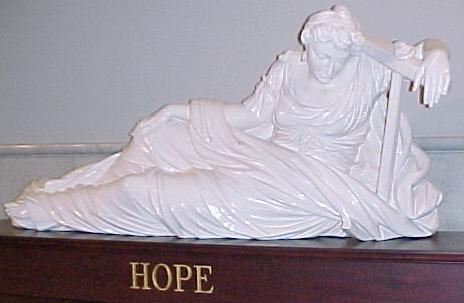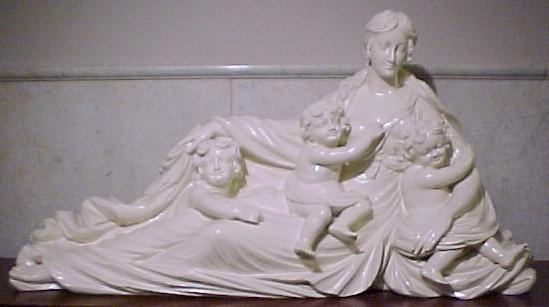
Faith - In the theological ladder, the explanation of which forms a part of the instruction of the First Degree of Masonry, faith is said to typify the lowest round. Faith, here, is synonymous with confidence or trust, and hence we find merely a repetition of the lesson which had been previously taught that the first, the essential qualification of a candidate for initiation, is that he should trust in God. In the lecture of the same Degree, it is said that "Faith may be lost in sight; Hope ends in fruition; but Charity extends beyond the grave, through the boundless realms of eternity." And this is said, because as faith is "the evidence of things not seen," when we see we no longer believe by faith but through demonstration; and as hope lives only in the expectation of possession, it ceases to exist when the object once hoped for is at length enjoyed, but charity, exercised on earth in acts of mutual kindness and forbearance, is still found in the world to come, in the sublimer form of mercy from God to his erring creatures.

Hope - The second round in the theological and Masonic ladder, and symbolic of a hope in immortality. It is appropriately placed there, for, having attained the first, or faith in God, we are led by a belief in His wisdom and goodness to the hope of immortality. This is but a reasonable expectation; without it, virtue would lose its necessary stimulus and vice its salutary fear; life would be devoid of joy, and the grave but a scene of desolation. The ancients represented Hope by a Nymph or maiden holding in her hand a bouquet of opening flowers, indicative of the coming fruit; but in modern and Masonic iconology, the science of Craft illustrations and likenesses, it is represented by a virgin leaning on an anchor, the anchor itself being a symbol of hope.

Charity - "Though I speak with the tongues of men and angels, and have not charity, I am become as sounding brass, or a tinkling cymbal. And though I have the gift of prophecy, and understand all mysteries and all knowledge; and though I have all faith, so that I could remove mountains, and have not charity, I am nothing" (First Corinthians xiii, 1-2). Such was the language of an eminent apostle of the Christian church, and such is the sentiment that constitutes the cementing bond of Freemasonry. The apostle, in comparing it with faith and hope, calls it the greatest of the three, and hence in Freemasonry it is made the topmost round of its mystic ladder. We must not fall into the too common error that charity is only that sentiment of commiseration which leads us to assist the poor with pecuniary donations. Its Masonic, as well as its Christian application, is more noble and more extensive. The word used by the apostle is, in the original translation, love, a word denoting that kindly state of mind which renders a person full of good-will and affectionate regard toward others. John Wesley expressed his regret that the Greek had not been correctly translated as love instead of charity, so that the apostolic triad of virtues would have been, not "faith, hope, and charity," but "faith, hope, and love." Then would we have understood the comparison made by Saint Paul, when he said, "Though I bestow all my goods to feed the poor, and though I give my body to be burned, and have not love, it profiteth me nothing." Guided by this sentiment, the true Freemason will "suffer long and be kind." He will be slow to anger and easy to forgive. He will stay his falling Brother by gentle admonition, and warn him with kindness of approaching danger. He will not open his ear to the slanderers, and will close his lips against all reproach. His faults and his follies will be locked in his breast, and the prayer for mercy will ascend to Jehovah for his Brother's sins. Nor will these sentiments of benevolence be confined to those who are bound to him by ties of kindred or worldly friendship alone; but, extending them throughout the globe, he will love and cherish all who sit beneath the broad canopy of our universal Lodge. For it is the boast of our Institution, that a Freemason, destitute and worthy, may find in every clime a Brother, and in every land a home.
No comments:
Post a Comment